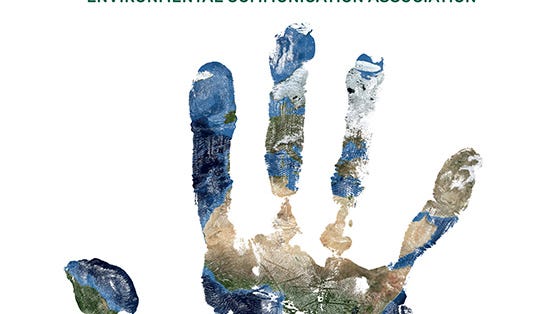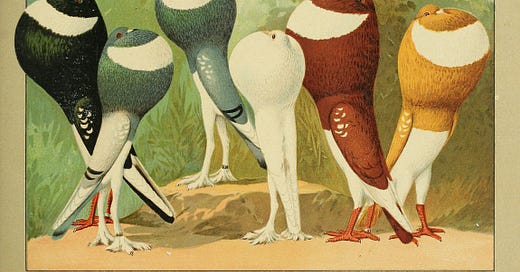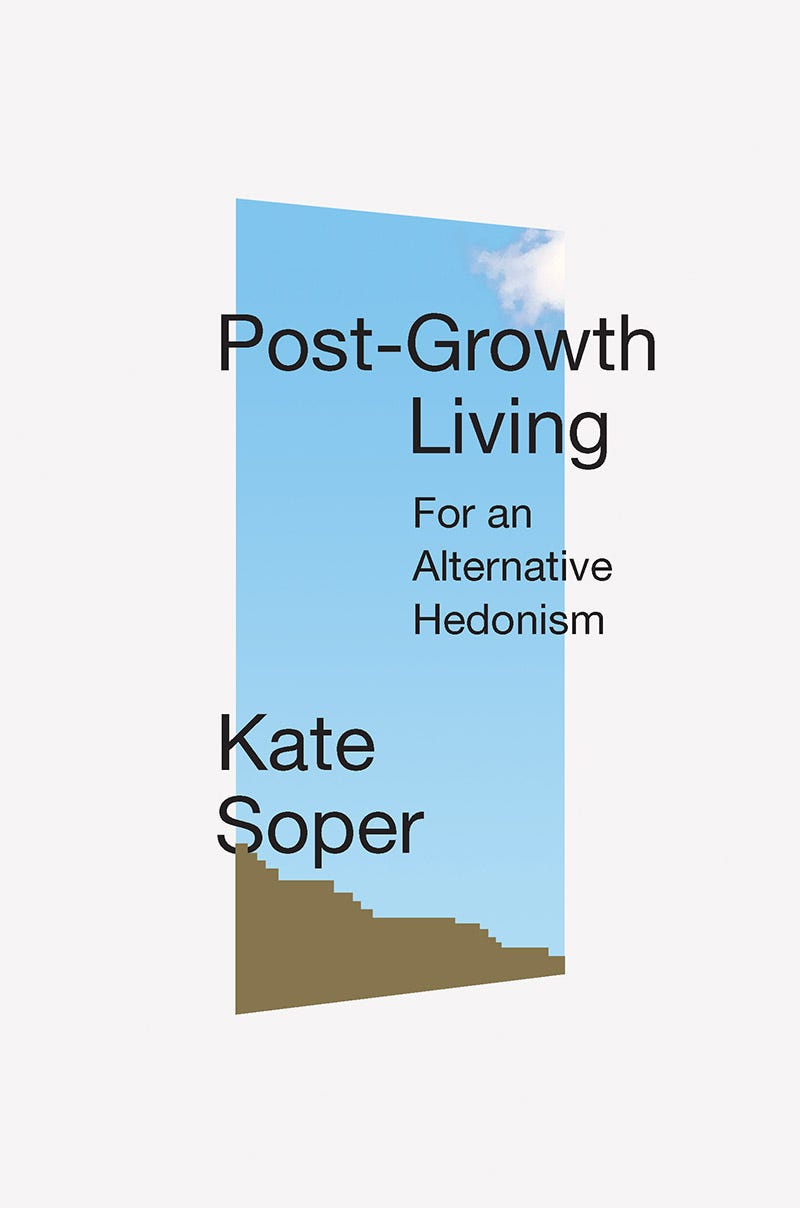🌿Wild Ones #63: Environmental Communication Digest
"Alternative Hedonism" for Environmental Communication + Debates on Rewilding + Individualism, Structuralism, and Climate Change + more!

Hi everyone, welcome back to Wild Ones, a (usually) weekly digest by me, Gavin Lamb, about news, ideas, research, and tips in environmental communication. If you’re new, welcome! You can read more about why I started Wild Ones here. Sign up here to get these digests in your inbox:
📚 What I’m reading
Post-Growth Living: For an Alternative Hedonism, by Kate Soper (2020), Verso.
Kate Soper is an environmental philosopher who explores environmental ethics and the history of environmental ideas in her work, such as in her previous book What is Nature?: Culture, Politics and the Non-Human. I’ve had this book on my digital bookshelf for a few months now and have skimmed it a little, but I’m hoping to dig into it more this week and share some takeaways in a coming digest.
Soper’s main aim in the book (I gather so far) is to call for new ways to communicate ‘the good life’ in the environmental movement that do not just focus on emotions of climate fear and environmental guilt about the ecological destructiveness of living high-consumption lifestyles, but instead highlights the “sensually impoverishing aspects of consumer culture” and advocates for the pleasures of an ‘alternative hedonism’ found in a ‘less acquisitive way of living.’ As Soper writes:
“Unlike the more alarmist responses to climate change, alternative hedonism dwells on the pleasures to be gained by adopting a less high-speed, consumption-oriented way of living…Its advocates believe that new forms of desire — rather than fears of ecological disaster — are more likely to encourage sustainable modes of consuming…a counter-consumerist ethic and politics should appeal not only to altruistic compassion and environmental concern (as in the case of Fair Trade and ethical shopping), but also to the self-regarding gratifications of living and consuming differently….”
Read more about Soper’s proposal for ‘post-growth living’ in this chapter adapted from her book in the Places Journal: The Trouble with Consumption.
🎧 What I’m listening to
This was an interesting debate about rewilding in Britain on the Intelligence Squared podcast (you can also watch video of the debate on YouTube). I tuned in because I saw the environmental journalist George Monbiot was one of the debaters. I’ve been following his environmental writing, and in particular his advocacy for rewilding, ever since reading his 2013 book Feral: Searching for Enchantment on the Frontiers of Rewilding. In that book, he described rewilding like this:
“Rewilding, unlike conservation, has no fixed objective: it is driven not by human management but by natural processes. There is no point at which it can be said to have arrived. Rewilding of the kind that interests me does not seek to control the natural world, to re-create a particular ecosystem or landscape, but — having brought back some of the missing species — to allow it to find its own way.”
A quick search on google’s ngram shows that use of the term ‘rewilding’ has skyrocketed over the past twenty years mostly in the United Kingdom but also around the world too. I imagine this is at least in part due to George Monbiot’s journalism and advocacy on the topic. The term seems to have a lot more recognition and uptake in Europe than in the North American context. But I’ve written about how different ideas about rewilding have been adopted in the U.S. and Canada, especially in the contexts of wolf reintroduction efforts and the Land Back movement. Here is some more of my writing on rewilding if you want to find out more about books/ideas on the topic!😊:
👀 What I’m watching
🔍 Tools & Resources I’m exploring


📰 News and Events
National TV networks mention climate change in 32% of segments on global extreme heat. By Ted Macdonald in Media Matters (July 19, 2022): "
“Despite the clear links between climate change and extreme heat, corporate broadcast and cable TV news programs failed to consistently connect climate change to these global extreme heat events. Out of 62 combined segments and weather reports discussing the historic heat waves on ABC, CBS, NBC, CNN, and MSNBC, from July 16-18, only 20 (32%) mentioned climate change. The vast majority of extreme heat segments mentioning climate (16) were related to the European heat wave.”
In Conversation With Angélique Kidjo on “the power of art in moving hearts and minds; and how her climate work has overlapped with, and informed, other issues she has made it her mission to address, such as gender equality. How can artists around the world tap into this collective potential to make a difference?” Hosted at Climate Forward London June 30–July 2, 2022, by The New York Times.
Here are some other environmental communication-related talks from the Climate Forward London event to check out (on YouTube):

📚 Research
Individualism, Structuralism, and Climate Change. By Michael Brownstein, Daniel Kelly & Alex Madva in Environmental Communication:
“…how can the climate community more effectively let people know what they can do, as indi-viduals, to help fight climate change? Oppositional thinking risks creating a motivational morass if individualist-oriented advice—flying less often, eating less meat—is seen as doable but ineffective, while structuralist-oriented advice—creating “structural reform” or “changing the system”—is seen as vague, unachievable, or overwhelming. A symbiotic alternative is to direct individuals to the variety of social roles they can play to create and sustain structural change”


Discourse analysis of environmental policy revisited: traditions, trends, perspectives By Sina Leipold, Peter H. Feindt, Georg Winkel & Reiner Keller. A Special Issue In Journal of Environmental Policy & Planning:
“Since the mid-1990s, discourse analysis has become an increasingly established framework in environmental policy analysis. The field has diversified in terms of conceptual approaches, methods, topics, and geographies. This special issue revisits trends and traditions regarding theoretical and methodological approaches, ‘old’ and ‘new’ discourses, and our knowledge about discursive effects. We contextualize and discuss the twelve contributions to this special issue against the broader trajectory of the field over the past 25 years.”

💡 Ideas
📚Saving Mother Earth: New Books About Feminism and Women Protecting the Planet. By John R. Platt in The Revalator.

📚Another great eco-book collection from The Revalator: Ten New Environmental Books Offering Inspiration, Insight and Ideas
👀Some recent-ish TEDx talks related to environmental communication:
Environmental interdependence is our climate solution. By Audra Barber at TEDxCU (video)
The Power of Communication in Affecting Environmental Impact. By Jeannine Bartz at TEDxKerrisdale.
👀Is Wildness Over? A discussion with Paul Wapner and Victoria Kiechel (video): “Climate change, mass extinction, pandemics: Something powerful is wrecking life on the planet. This presentation will explain how current planetary ecological challenges are the result of trying to rid our lives of wildness.”
For the climate’s sake, keep Arctic communication open: “Pan-Arctic collaborations must continue, even if informally, between researchers inside and outside Russia.” Editorial in Nature.
The Cosmic Miracle of Trees: Astronaut Leland Melvin Reads Pablo Neruda’s Love Letter to Earth’s Forests. From The Marginalia by Maria Popova. Read “At the 2020 Universe in Verse, celebrating fifty years of Earth Day.”
“Anyone who hasn’t been in the Chilean forest doesn’t know this planet. I have come out of that landscape, that mud, that silence, to roam, to go singing through the world.”
– Pablo Neruda,
🌎 Today in environmental history
• July 25, 1846: Henry David Thoreau is jailed for refusing to pay taxes due to his opposition to slavery and the Mexican-American war:
“Under a government which imprisons any unjustly, the true place for a just man is also a prison.”
– Civil Disobedience, cited in the 2022 Verso Radical Diary.


🗄️From the archive!
🌿Wild Ones #49: Environmental Communication Digest: Environmental keyword: Communicative Power + 'Wild Souls' a new book by Emma Marris + Storytelling and Ecology + More!
💬 Quotes I’m thinking about
“The commitment to an alternative politics of prosperity based on a sustainable economic order needs to be seen as a continuation of the emancipatory project. If we have a cosmopolitan care for the well-being of the poor of the world, and a concern about the quality of life for future generations, then we have to campaign for a change of attitudes to work, consumption, pleasure, and self-realisation in affluent communities. Such a revolution will be comparable in the forms of social transformation and personal epiphany it will demand to those brought about through the feminist, anti-racist, and anti-colonialist movements of recent history. Those who commit to it will be helping to improve both their own lives and those of future generations.”
– Kate Soper, Post-Growth Living: For an alternative Hedonism
“It is difficult to get a man to understand something, when his salary depends on his not understanding it.” – Upton Sinclair, in “What Joe Manchin Cost Us” by Dr. Leah Stokes in the NYTimes
“In the long run, we are going to win. Fossil fuels are just too expensive, dirty and dangerous.” – Dr. Leah Stokes, also in the NYTimes.


Thanks so much as always for your interest in my work, and if you found this digest useful, please consider sharing with others who might find it interesting too😊 I'd also love to hear from you. Leave a comment to let me know what you think about this digest, what areas of environmental communication you’re involved in/most interest you, or anything you’d like to see more of in Wild Ones:)






